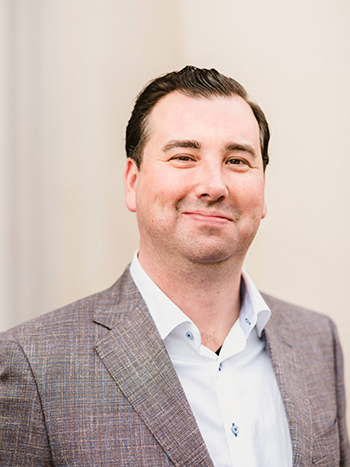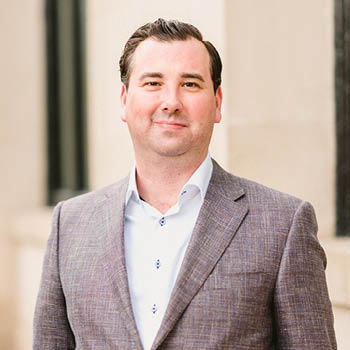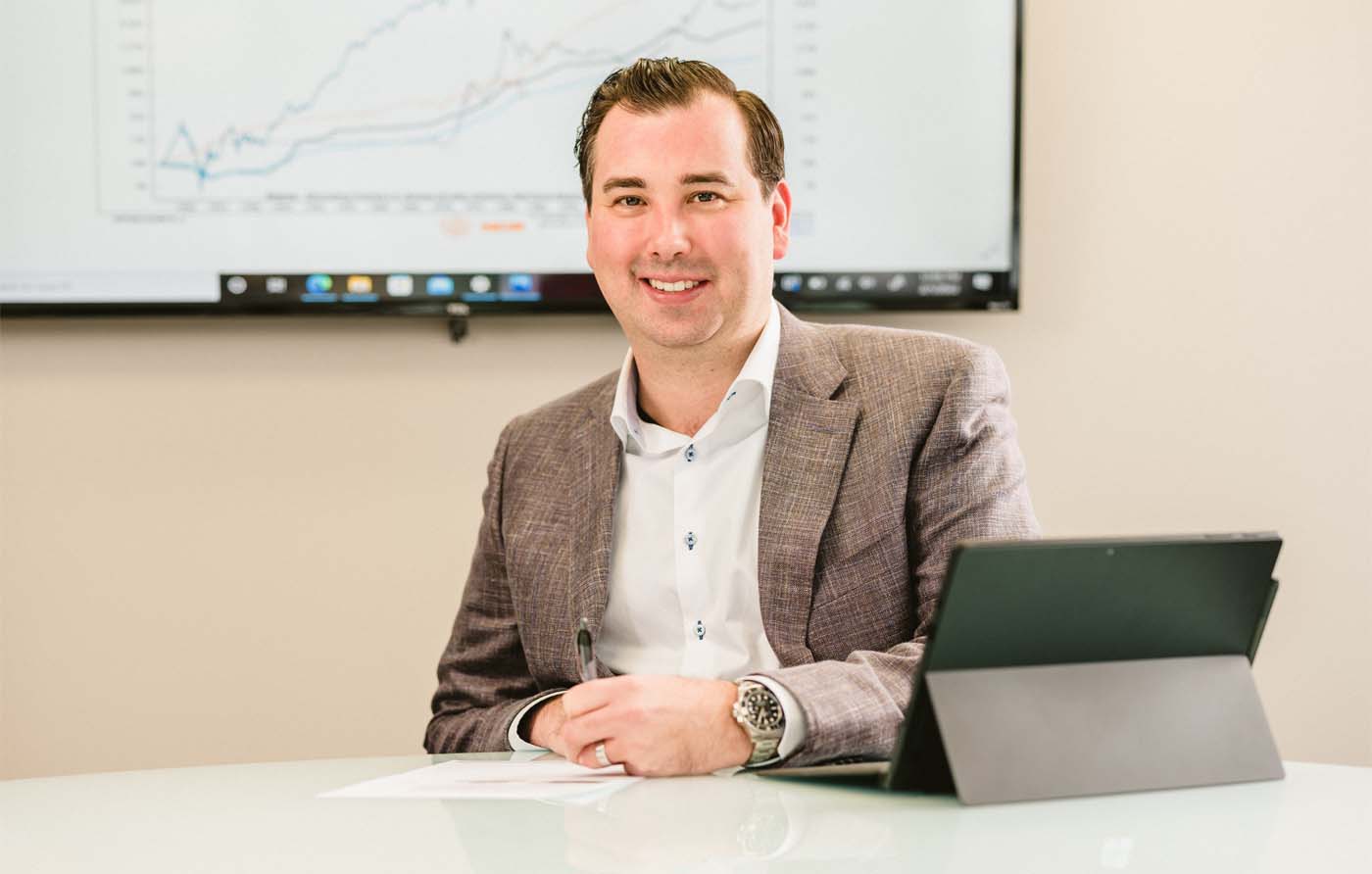Behavioral guidance keeps clients focused on the long term
Behavioral guidance keeps clients focused on the long term

Ryan Gorman, CFA, CMT, BFA • Grand Rapids, MI
Callesen Wealth Management • Independent Financial Partners
Proactive Advisor Magazine: Ryan, what led you to become a financial advisor?
As I look back, my strong interest in financial services really started in high school. My favorite course was economics. I was rather proud—and just a little embarrassed—that my teacher would call on me and say, “Let’s hear from the economist.” I also took an elective course in accounting. After studying those two disciplines, I wanted to learn more about financial services as a career. I worked part-time in high school as a bank teller and in accounting for a savings and loan in our area. This was part of what is called a DECA program, which helps facilitate work-study programs or internships for students.
Around the same time, one of my co-workers gave me a copy of William O’Neil’s classic book, “How to Make Money in Stocks.” I found that fascinating. When I turned 18, I opened my own brokerage account and started investing. I attended the Lubar School of Business at the University of Wisconsin-Milwaukee, where I earned a bachelor’s degree in business administration, with a major in finance and minor in economics. I was an officer for our college’s investment club, where I was deeply involved in portfolio management. We had a grant from a large financial firm and took our real money investing very seriously.
 I continued to work in banking during college, while also having internships at a national brokerage firm and a professional sports team. I ended up going to another bank during my last two years at college, where I was a personal banker. That was a great experience, providing exposure to all of the major areas of the bank. After graduation, I took a full-time position with the bank. I also studied and passed level 1 of the Chartered Financial Analyst (CFA) program, which involves education in financial analysis, investment management, ethics, and other disciplines. After two years at the bank, I interviewed with Callesen Wealth Management. I feel very fortunate to have found the opportunity to work at a firm with a long history of excellence and with a CEO who has been a terrific mentor.
I continued to work in banking during college, while also having internships at a national brokerage firm and a professional sports team. I ended up going to another bank during my last two years at college, where I was a personal banker. That was a great experience, providing exposure to all of the major areas of the bank. After graduation, I took a full-time position with the bank. I also studied and passed level 1 of the Chartered Financial Analyst (CFA) program, which involves education in financial analysis, investment management, ethics, and other disciplines. After two years at the bank, I interviewed with Callesen Wealth Management. I feel very fortunate to have found the opportunity to work at a firm with a long history of excellence and with a CEO who has been a terrific mentor.
Since joining the firm, I finished the work for the CFA designation and also earned the designations of Chartered Market Technician (CMT) and Behavioral Financial Advisor (BFA). As a wealth advisor, I believe in the value of continuing education. I think all of my professional courses of study have added greatly to my ability to serve the needs of our clients in a highly professional manner.
Describe your current responsibilities at the firm.
I serve in three roles at Callesen Wealth Management: as partner, chief investment officer, and behavioral investment counselor. As a partner, I am involved in business strategy, client acquisition efforts, and the overall operations of the firm. As CIO, I help set our firm’s overall approach to asset allocation, research our individual investment holdings, provide due diligence on various investment solutions, and manage portfolio trades.
As a behavioral investment counselor and wealth advisor, I help my clients determine the financial goals and life values that are most important to them. From there, we develop a portfolio strategy that is customized to their specific needs and objectives. As our clients’ behavioral coach, I seek to keep them focused on the long-term plan. We use a shorthand phrase to describe our approach, which is “Goal. Plan. Portfolio.”
Our firm’s objective is to provide an assortment of strategies for investors in all stages of life, from the accumulation stage to those looking for asset-preservation plans and retirement-income planning. We are committed to our role as fiduciaries, and we measure the success of our firm by the progress our clients make toward their financial goals. We want to guide people in exhibiting good financial behavior—helping them to take a disciplined planning and investment approach—through advocacy and education.
“We use a shorthand phrase to describe our approach, which is ‘Goal. Plan. Portfolio.’”
Talk about your overall investment planning philosophy.
We believe in goals-based investing. Goals and values are the reason we all need money or assets—to help us achieve what is important in our lives and for our families. Money itself is fundamentally an abstract idea. Achieving our aspirations is the real desired outcome for anyone, and money is simply one of the tools used to get there.
Investment management is a differentiator for our firm, and I think we take a unique approach. As one trained in both behavioral finance and technical analysis, I try to bridge or meld the behavioral side of guiding the client relationship with understanding the behavior of the markets—both from a technical perspective and via market sentiment.
Both client relationships and portfolio management are centered on understanding risk tolerance, risk capacity, and income replacement needs. We use two third-party tools to help evaluate a client’s risk tolerance. One of these incorporates many sophisticated behavioral finance concepts. It factors in investor bias and investor types, and it offers proprietary tools to measure risk tolerance. It has been my experience that risk tolerance is not a static number and can change based on many factors—including the market or economic environment. We determine risk capacity and income needs using a family index approach. It is the capital requirement and rate of return requirement needed to provide the income that makes the financial and investment plan work. This is one of the more important facets of retirement planning.
As a CFA and CMT charterholder, I believe in the use of active investment strategies for many of our client portfolios, if they are compatible with their overall plan objectives. Even our passive ETF models use trend following and momentum to manage risk. Due to the sequence-of-return risk that can have massive impacts on retirement assets, we employ models that seek to reduce downside volatility.
According to studies done by JPMorgan, the market experiences around a 14% drawdown on average each year. We are not overly concerned with drawdowns at that level over the long term, and we share that perspective with clients. Our broader risk-management objective is to strive for mitigation of the significant 30% to 50%-plus drawdowns that can occur in true bear markets. Being based in Michigan, we cannot guarantee that we can always navigate icy or snowy driving conditions during our severe winter weather. But we certainly can know when to take it cautiously on the roads or not attempt to drive at all. I view the financial markets similarly, and that is reflected in our investment philosophy that emphasizes risk management.
What would you ideally like your firm to be known for?
Our firm celebrated its 50th anniversary in 2019. We are proud to work for a firm that is deeply involved in the community and that has a long tradition of serving the important financial needs of clients. I want our firm to be known as professional and caring, delivering excellence in service and our guidance. We believe our clients should always know what to expect when working with our firm. To this end, our management team has articulated a “Client Bill of Rights” that outlines the foundational principles of how we pledge to serve our clients’ needs.
We are not afraid to work and think outside the box—offering clients a perspective they might otherwise not find. We strive to deliver sophisticated and timely guidance and stay on top of the latest developments and solutions within our industry. I find it very satisfying to work with clients who are open to thinking differently and that can understand the big picture of focusing on their customized goals and risk management. While it can be enticing for clients to seek high returns at all times in the market, that is usually accompanied by unacceptably high levels of risk. In our opinion, that is not what wins the retirement race over the long term.
 Ryan Gorman is a wealth advisor, partner, and chief investment officer at Callesen Wealth Management, where he is also the behavioral investment counselor. The advisory practice has offices in Manistee and Grand Rapids, Michigan. Mr. Gorman says, “I help my clients determine the financial goals and life values that are most important to them.”
Ryan Gorman is a wealth advisor, partner, and chief investment officer at Callesen Wealth Management, where he is also the behavioral investment counselor. The advisory practice has offices in Manistee and Grand Rapids, Michigan. Mr. Gorman says, “I help my clients determine the financial goals and life values that are most important to them.”
Mr. Gorman was born in Grand Rapids and spent his school years in Florida and Michigan. His father was an executive in the retail industry, and his mother worked part-time in insurance and travel while raising Mr. Gorman and his younger sister. Mr. Gorman says he greatly enjoyed high school, both for his time playing in a band and his academic exposure to economics and accounting. He began working for a local bank as part of a high school internship and worked as a teller and in accounting for two banks during college. He says his interest in the financial markets began during this period, as he was exposed to classic investment books and opened a brokerage account.
Mr. Gorman attended the Lubar School of Business at the University of Wisconsin-Milwaukee, where he graduated with a Bachelor of Science degree in finance with a minor in economics. In addition to working in the banking industry during college, Mr. Gorman had internships with a brokerage firm and a professional sports team. He was an officer of his school’s investment club, where, he says, “We all developed a passion for learning disciplined investment principles, and many of us have remained friends.”
Following his graduation from college, Mr. Gorman worked in a full-time position as a personal banker for about two years. He joined Callesen Wealth Management in 2012, assuming positions of increasing responsibility on the firm’s management team and becoming a partner in 2016. Callesen Wealth Management celebrated its 50th anniversary in 2019. Mr. Gorman has earned the designations of Chartered Financial Analyst (CFA), Chartered Market Technician (CMT), and Behavioral Financial Advisor (BFA). He says he is proud of working for a firm that has “helped so many people in such an important way.”
Mr. Gorman and his wife were married in 2021 and live in the Grand Rapids area, spending occasional weekends in Manistee. He says they enjoy visiting with their families and trips to Michigan vineyards and beaches. Mr. Gorman is an avid fan of a wide variety of music and closely follows professional hockey. He says Callesen Wealth Management is an active supporter of many local charities and organizations.
Disclosure: Securities offered through IFP Securities LLC, DBA Independent Financial Partners (IFP), member FINRA/SIPC. Investment advice offered through IFP Advisors LLC, DBA Independent Financial Partners (IFP), a registered investment advisor. IFP and Callesen Wealth Management are not affiliated.
Photography by Ryan Inman
New this week:

Delivering a fiduciary ‘pledge’ to clients
Ryan Gorman, CFA, CMT, BFA, is a wealth advisor, partner, and chief investment officer at Callesen Wealth Management, where he is also the behavioral investment counselor. He says they are a fiduciary financial-planning firm offering comprehensive wealth and investment planning.
Callesen Wealth Management notes, “As fiduciaries, we’ve made a promise to always act in our clients’ best interest above our own. In doing so, we’re dedicated to being transparent with our offerings and honest about any conflicts of interest.”
The firm’s fiduciary pledge to clients consists of the following principles:
- Understand that a fiduciary holds an ethical relationship of trust and must prudently care for all client assets.
- Plainly state all fees and compensation received due to client engagement.
- Be cognizant of all conflicts of interest and take measures to declare and resolve them while avoiding revenue-sharing agreements whenever possible.
- Decline perks paid for by mutual funds and insurance companies using shareholder money.
- Manage investments in a disciplined and defensible manner and educate clients on what they own and why they own it.
- Never bow to a corporate culture that dictates sales goals, commissions, or obligations to a parent company.


